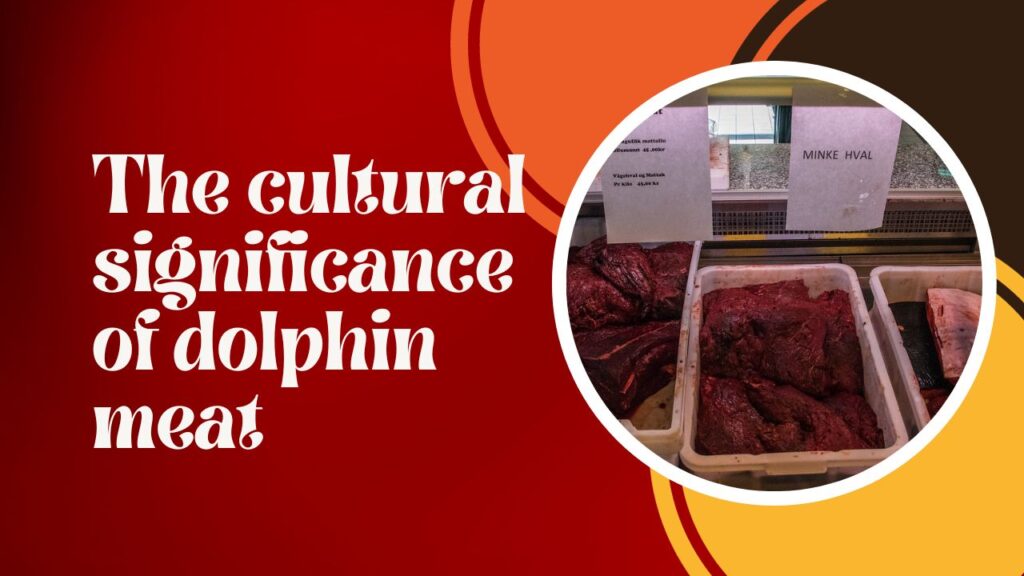
Dolphins have long been captivating creatures, known for their intelligence, agility, and playful nature. But have you ever wondered what does dolphin meat looks like? This question has sparked a controversial debate among seafood enthusiasts, conservationists, and curious individuals alike.
In this thought-provoking article, we will delve into the world of dolphin meat, examining its appearance, cultural significance, and most importantly, the ethical implications surrounding its consumption. Join us on this journey as we explore the curiosity of dolphin meat and seek to answer the question: should we eat it?
The answer of what does dolphin meat looks like? Dolphin meat is a deep, dark red that borders on black. It is a dense meat, with a slightly chewy consistency. The texture is often compared to beef or venison. The fat of dolphin is located in a layer of blubber between the meat and the skin.
Table of Contents
The Appearance of Dolphin Meat: What Does Dolphin Meat Looks Like
The appearance of dolphin meat is quite distinct and can vary depending on the way it is prepared. Dolphin meat is typically dark in color, ranging from a deep red to a purplish hue. It has a firm texture and is often described as being similar to beef or pork.
The flesh of dolphins is known to be quite lean, with minimal fat content. This gives it a slightly chewy and dense texture when cooked. When prepared for consumption, dolphin meat is commonly sliced into steaks or fillets, much like other types of seafood.
These cuts can showcase a rich, vibrant color that is visually appealing. However, it is important to note that due to the high levels of mercury found in dolphins, it is not recommended for human consumption.
It is crucial to prioritize the conservation and protection of these magnificent marine creatures, rather than considering them as a food source.
Dolphin meat has been a subject of controversy and ethical debate, with many countries and organizations advocating for their conservation and strict regulations against hunting or consuming them.
While the appearance of dolphin meat may pique curiosity, it is essential to approach this topic with a focus on environmental sustainability and the well-being of these intelligent beings.
See Also: What Is Dolphin Meat Called? From Delicacy to Debate
The Cultural Significance of Dolphin Meat
The cultural significance of dolphin meat is a topic that sparks curiosity and debate among individuals around the world. In some cultures, particularly in certain regions of Asia and the Faroe Islands, dolphin meat has been historically consumed as a part of their traditional cuisine.
This consumption has been deeply rooted in their cultural practices and beliefs, and it holds a significant place in their culinary heritage. For instance, in certain coastal communities, dolphins have been considered a valuable food source due to their abundance in the surrounding waters.

Their meat has been incorporated into traditional dishes, often prepared with various cooking methods and spices to enhance its flavor. In these cultures, consuming dolphin meat is seen as a way to connect with their ancestors and maintain a strong bond with their maritime roots.
However, it is important to note that the consumption of dolphin meat is a highly controversial topic worldwide. Many animal rights advocates strongly condemn the hunting and consumption of dolphins due to concerns about sustainability, conservation, and animal welfare.
Dolphins are highly intelligent and social creatures, and some argue that they should be protected rather than hunted for their meat. In countries where dolphin meat is still consumed, there are ongoing discussions about the ethical aspects of this practice.
Conservation efforts are being implemented to raise awareness about the importance of protecting these majestic creatures and finding alternative sources of sustenance.
Ultimately, the cultural significance of dolphin meat highlights the complex intersection of traditions, beliefs, and ethical considerations. It is essential to approach this topic with sensitivity and an open mind, recognizing the diverse perspectives and values that exist around the world.
See Also: Are Dolphins Teeth Sharper Than Sharks? Unlocking the Mystery
The Ethical Implications of Consuming Dolphin Meat
When it comes to the topic of consuming dolphin meat, there are significant ethical implications that cannot be ignored. Dolphins are highly intelligent and social creatures, often revered for their playful and gentle nature.
As such, the idea of eating their meat raises questions about animal welfare and conservation. Firstly, it’s important to consider the impact of consuming dolphin meat on their population and ecosystems.
Dolphins are not traditionally harvested for meat, and their populations are already under threat due to factors such as pollution, habitat loss, and fishing practices.
Adding them to the list of species hunted for their meat could further endanger their survival. Additionally, the ethical concerns extend beyond the conservation aspect. Dolphins are known for their advanced cognitive abilities, with research indicating their self-awareness, problem-solving skills, and complex social structures.
Eating the flesh of such intelligent beings raises moral dilemmas about our treatment and respect towards sentient creatures. Furthermore, there is a question of cultural sensitivity.
Dolphin consumption may be culturally acceptable in some regions, but it is important to recognize and respect the viewpoints of others who consider dolphins as intelligent and emotional beings deserving protection rather than being consumed as food.
When considering the consumption of dolphin meat, it is crucial to reflect on the ethical implications.
The impact on dolphin populations and ecosystems, the cognitive abilities and social structures of dolphins, and cultural sensitivities all weigh heavily on the decision to consume their meat. Ultimately, it is our responsibility to ensure the well-being and conservation of these remarkable marine creatures.
Frequently Asked Questions (FAQs)
What Does Raw Dolphin Meat Look Like?
Raw dolphin meat is typically dark red or brownish in color, similar to other types of dark, lean meats.
How Does Cooked Dolphin Meat Appear?
When cooked, dolphin meat can resemble other cooked meats such as beef or pork, depending on how it is prepared. However, it’s important to note that consuming dolphin meat is controversial and illegal in many countries due to conservation efforts and ethical concerns.
Is It Common To Consume Dolphin Meat?
No, it is not common to consume dolphin meat. In fact, hunting dolphins for meat is illegal in many countries due to their intelligence, conservation status, and ethical concerns. There are strong regulations in place to protect dolphin populations, and the consumption of dolphin meat is widely discouraged.
Conclusion
After exploring the curiosity of what dolphin meat looks like and whether we should eat it, it is clear that consuming dolphin meat is highly controversial and ethically questionable.
Dolphins are highly intelligent and social creatures, and their consumption raises serious ethical concerns. Additionally, dolphins are protected species in many countries due to their declining population.
While some cultures may have historically consumed dolphin meat, it is important to recognize the negative impact this can have on their populations and ecosystems.
The hunting and consumption of dolphins can disrupt marine ecosystems and contribute to their decline. Moreover, dolphin meat can also pose health risks to humans.
Dolphins are known to bioaccumulate toxins such as mercury and PCBs in their bodies, which can have detrimental effects on human health when consumed.
Considering these factors, it is advisable to focus on promoting the conservation and protection of dolphins rather than considering them as a food source.
There are plenty of other sustainable and ethical food options available that do not pose risks to ecosystems or our health.
The curiosity surrounding dolphin meat may exist, but it is important to prioritize the conservation and well-being of these intelligent creatures over any potential culinary interest.
Let us appreciate and admire dolphins in their natural habitats rather than seeking to consume them.

Mr. Das, a certified pharmaceutical scientist, holds a Bachelor of Science in Pharmaceutical Sciences and passionately contributes to dolphin conservation as a member of the committee in Bangladesh.


